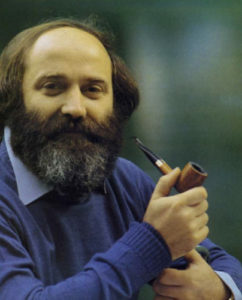Der französische Dirigent, Oboist und Musikwissenschaftler Jean-Claude Malgoire (* 25. November 1940 in Avignon) starb am 14. April 2018. Jean-Claude Malgoire begann seine musikalische Ausbildung am Konservatorium seiner Heimatstadt, um später zum Pariser Konservatorium zu wechseln. Dort erhielt er den 1. Preis für Oboe und für Kammermusik.
Malgoire war durch seinen Mitstudenten Heinz Holliger beeinflusst und bis in die 1980er Jahre aktiv der zeitgenössischen französischen Musik verbunden. Charles Münch berief ihn 1962 als Solooboist und Englischhornisten ins Orchestre de Paris. 1968 gewann er den 1. Preis des Internationalen Musikwettbewerbs in Genf. 1970 spielte er in der französischen Uraufführung von Luciano BeriosWerk Sequentia VII und 1972 wurde er Solist des „Ensembles 2e2m“.
Beeinflusst von seinem Lehrer Antoine Geoffroy-Dechaume (1905–2000), einem führenden Mitglied der „Société de musique d’autrefois“, gründete Malgoire 1966 mit Kollegen das Ensemble „La Grande Écurie et la Chambre du Roi“, eines der ersten Barockensembles mit historischer Aufführungspraxis in Frankreich. Die Gruppe hat bislang über 100 Aufnahmen eingespielt und mehr als 3000 Konzerte auf allen Kontinenten gegeben. Parallel zu seiner Tätigkeit als Dirigent des Ensembles spielte Malgoire in verschiedenen Symphonieorchestern u. a. unter Leitung von Seiji Ozawa und Herbert von Karajan.
Seit 1975 hatte Malgoire mehrere Opern auf historischen Instrumenten eingespielt, darunter die Welturaufführungen von Händels Rinaldo und Lullys Alceste. Seit dessen Gründung im Jahr 1981 war er künstlerischer Leiter des „Atelier lyrique“ in Tourcoing, das er zu einem Opernhaus mit vielfältigem Repertoire formte. 1992 erhielt er für seine Aufnahme von Vivaldis Motezuma einen Preis beim französischen Wettbewerb „Victoires de la musique“. Zahllose CD-Einspielungen vor allem bei CBS, Erato, Ricercar u. a. belegen seine hohe Kunst, barocke Musik lebendig zu machen. Sein Tod ist ein akuter Verlust für die Szene der Alten Musik. Quelle Wiki/ G.H.
Dazu noch ein Beitrag von von den Kollegen von Bach-Kantatas: The French conductor, Jean-Claude Malgoire, exhibited talent as a child and after studying music locally he enrolled at the Paris Conservatory, where he studied oboe and received first prizes there for his solo playing and in chamber music. Jean-Claude Malgoire embarked on a brilliant career as an instrumentalist at the age of 20, crowned by the first prize in 1968 in the Geneva International Competition. His interest in contemporary music brought a recording of music by Holliger, Castiglioni and Shinohara and in 1972 Bruno Maderna chose him as a principal in the Ensemble Européen de Musique contemporaine. He was subsquently appointed by Charles Munch as cor anglais soloist in the Orchestre de Paris. He played as an oboist for symphony orchestras such as the Orchestre de la RATP, Orchestre de la Société des Concerts du Conservatoire, and Orchestre de Paris. He often played jazz in night clubs in his early career with Michel Portal, Bernard Lubat, and other notable instrumentalists.
At the same time Jean-Claude Malgoire developed his interests as a conductor and musicologist, with his first opera recordings in 1975 paving the way for engagements in Copenhagen, Stockholm, Covent Garden in London, the Paris Opéra Garnier, Karlsruhe, Palermo, and the Teatro Real in Madrid. In 1966, while continuing his career as an oboist, he founded La Grande Écurie et la Chambre du Roy, a period-instrument ensemble devoted largely to Baroque music. He eventually abandoned playing oboe in orchestras (his last post was with the Orchestre de Paris), explaining he was not ultimately suited to the role. In 1981, he founded a second ensemble, this one the aforementioned Atelier de Tourcoing, largely devoted to the performance of Baroque and other early operas. Tours abroad in the 1970’s quickly established the high artistic values of Malgoire and his ensemble, notably in two Rameau productions, the 1974 Les Indes galantes at the English Bach Festival and the 1978 Hippolyte et Aricie at Covent Garden. Later triumphs included the 1986 Aix-en-Provence festival production of Campra’s Tancrède.
Jean-Claude Malgoire has been one of the more important French conductors of the latter 20th and early 21st centuries. He has focused heavily on Baroque music, though his repertory also includes operas by Mozart and Salieri. As music director of La Grande Écurie et la Chambre du Roy and l’Atelier Lyrique de Tourcoing, he has given many highly acclaimed concerts and opera productions, and made numerous recordings with major labels.
Jean-Claude Malgoire has more than 140 recordings to his credit, many of them of works recorded for the first time. Much of this has been brought about with the orchestra of La Grande Écurie et la Chambre du Roy, with which he has given more than two thousand concerts throughout the world. As the head of the Atelier Lyrique de Tourcoing, he has conducted operas that have twice won the prize for best opera production of the year, in 1983 with L’incoronazione di Poppea and in 1995 for the Mozart/Da Ponte trilogy Le nozze di Figaro, Don Giovanni and Così fan tutte. In addition to his interest in the music of the 17th and 18th centuries, he is one of the few conductors to have explored repertoire ranging from the 11thto the 20th centuries. In Europe he has appeared with orchestras including the Orchestre National de France, Orchestre National de Lille, Orchestre de Paris, Orchestre National d’Île de France, Dresdner Philharmonie and Kraków Philharmonic Orchestra.
Jean-Claude Malgoire has often been credited with unearthing previously lost manuscripts from the Baroque era. When he discovered two arias from Act I of Antonio Vivaldi’s Catone in Utica, he helped create a new version of the work for the acclaimed November 2001 live performance in Tourcoing.
Jean-Claude Malgoire continued his activities in the new century with numerous presentations of rare and familiar operas: in April 2002, he conducted l’Atelier Lyrique de Tourcoing in performances of Salieri’s Falstaff at the Municipal Theater in Tourcoing and also led a production there by the same forces of Georg Frideric Handel’s Rinaldo in October 2005 (Foto Bach-Cantatas/Malgoire/ CBS/ Sony).

